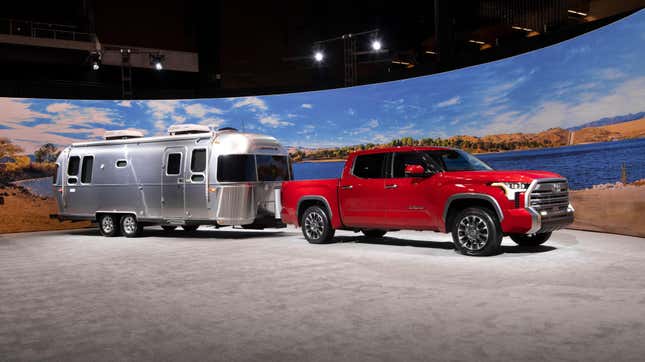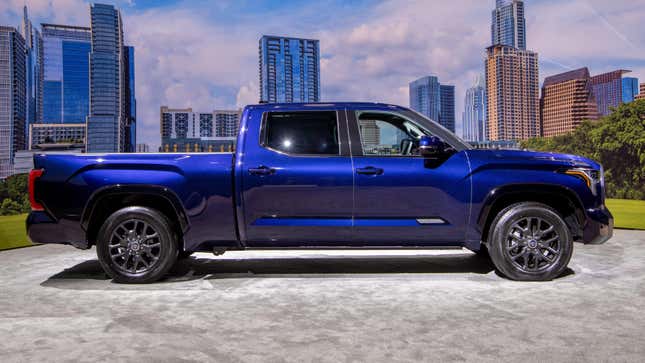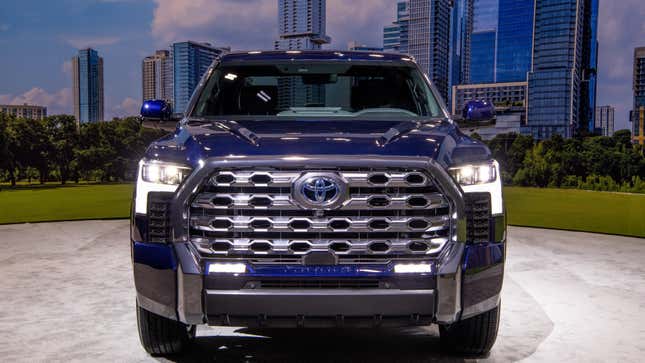The all-new Toyota Tundra is finally here, about a decade and a half after the truck’s last redesign. Even if I dislike the term “all-new,” I think it applies here since the 2022 Tundra is Toyota’s first full-size hybrid pickup, complete with a new platform, drivetrain and design — both in and out.
Toyota’s engineers say they wanted to rethink their approach for the Tundra, now in its third generation, and I think the biggest changes are about making the Tundra less like its competitors. Right down to the way Toyota conceives of the truck. The carmaker claims it’s happy to let its rivals — such as GM and Ford — keep the “work truck” image, while it wants people to see the Tundra as a “fun truck.” Really, I think it’s a way to avoid competing directly based on specs, because the new Tundra isn’t class-leading across the board. Though, it could be considered greater than the sum of its specs.
(Full Disclaimer: Toyota invited me to the full unveiling of its latest Tundra near its headquarters in Plano, Texas. The company flew me out there, put me up in a nice hotel and fed me, too. I also got to geek out with the truck’s engineers and designers.)
Let’s start with powertrains. The two available drivetrains are the following:
- A 3.5-liter Twin Turbo V6 making 389 horsepower and 479 lb-ft of torque.
- A Hybrid 3.5-liter Twin Turbo V6 making 437 horsepower and 583 lb-ft of torque.
If you were hoping for a diesel engine, I hate to let you down, but there won’t be one. Toyota says the hybrid can do what the diesel would, make torque down low, at 2,400 RPM. Mike Sweers, the Tundra’s Chief Engineer, said there wasn’t a good reason to install a diesel engine in there because the hybrid balances output and emissions best.
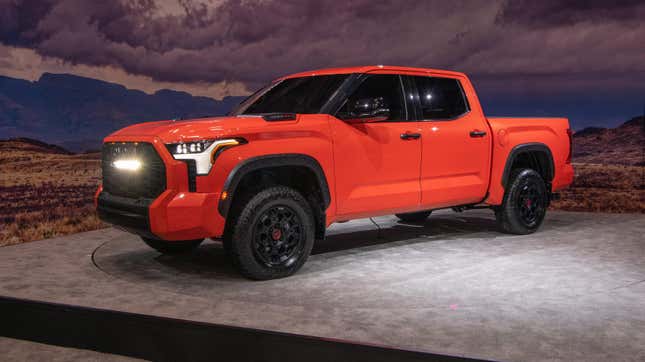
The TRD Pro Tundra will be hybrid-only, but a TRD “Off-Road package” will eventually make it to the ICE model, too. Toyota is consolidating platforms toward its Toyota New Global Architecture, so now this Tundra and the 2022 Land Cruiser (300-Series) share a platform. The truck will tow up to 12,000 pounds, but there is a disclaimer. The hybrid Tundra will tow from 11,300 to 11,500 pounds depending on options and packages. But in any configuration, the hybrid will tow less because of the battery and electric motor, which add weight and complexity to the drivetrain. The Tundra’s max payload is 1,940 pounds.
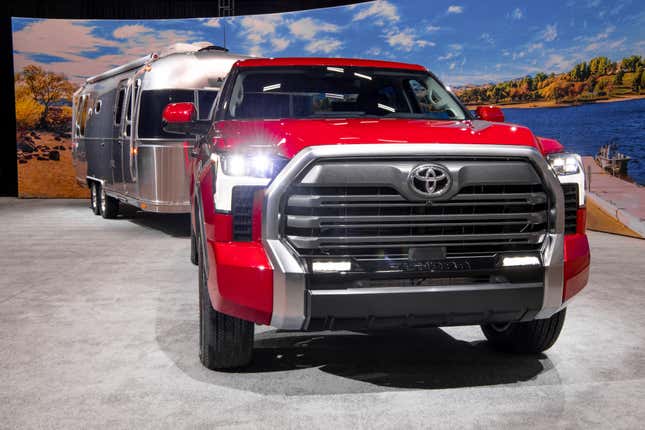
Hybrid Tundras are parallel hybrids, not plug-in hybrids, and Toyota did not mention anything about an EV model. Of course, Toyota’s competitors GM and Ford — have already announced EV pickups.
Another major change is in the suspension. There’s a double-wishbone up front with shocks from Bilstein or Fox, depending the package. The rear gets the biggest revision going from leaf springs to a multi-link setup with coil springs or an air suspension system, depending on options. This is a big deal.
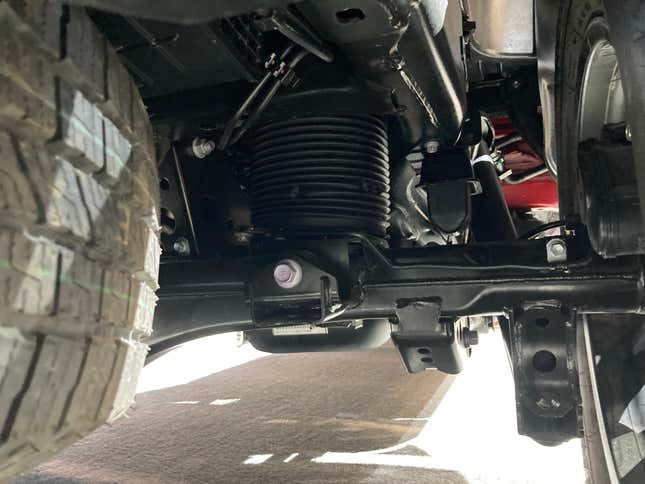
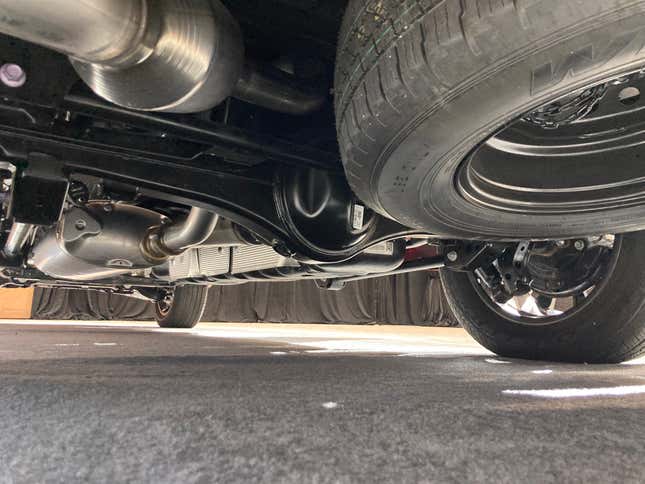
Crawling under there and looking at the suspension is just uncanny. I’m not used to ladder-frame trucks without leaf packs, but then again, the new Tundra is trying to carve out a certain place for itself in the market. Toyota claims the biggest group of first-time truck buyers are coming from luxury SUVs. You can bet those drivers are used to a level of ride comfort that traditional trucks — the so called “work trucks” — can’t match.
While we’re on the subject of work trucks, let’s talk cabs and beds. The new Tundra will only come in four-door configurations, either as a Double Cab or a CrewMax. No more single cabs! Sweers said Toyota will never make a single cab Tundra again, at least not for the American market.
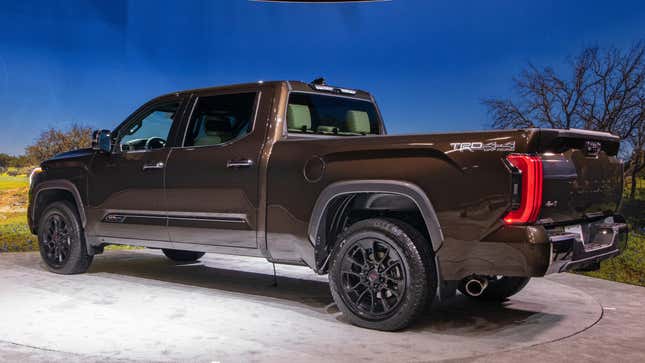
When I asked why, Sweers told me it’s simply because no one buys them. Single cab Tundras accounted for one percent of U.S. Tundra sales in 2020, and below four percent for other truck makers. He also said that just ten years ago, single cabs easily outsold double cabs. Now, Single cab buyers have moved onto double cabs, and double cab drivers buy the CrewMax.
There is still a longbed available and the configurations will break down in the following ways:
- Double Cab: Available with a 6.5 foot bed, or an 8.1 foot bed.
- CrewMax: Available with a 5.5 foot bed, or a 6.5 foot bed.
So, say goodbye to the single cab, long bed Tundra. The single cab, long bed was a good truck, but that’s not where the sales are.
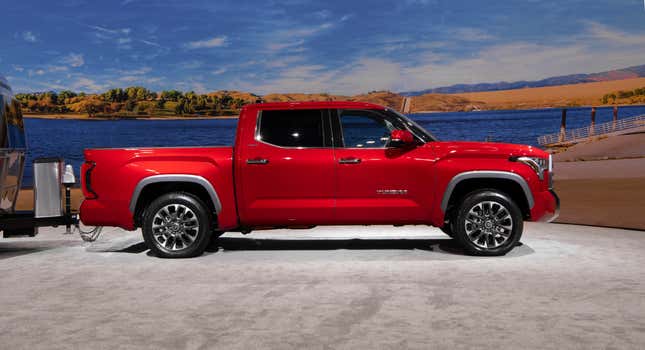
Toyota says its focus is still on durability. Of course, anyone can say that; proving it is another matter. Regardless of Toyota’s track record, no car or truck is perfect. As an example, the outgoing Tundra was known to have transmission cooling issues, specifically when towing. So, Toyota added a transmission oil cooler in this model.
Sweers’ goal was mainly durability, but also to encourage drivers who would otherwise be intimidated by towing or put off by anecdotal accounts of towing harming older Tundras. He wants so-called towing “weekend warriors” to use their Tundras to tow more often, which explains the driver aids (and load-leveling air suspension) in the new Tundra. Those aids come in the form of different tow modes that adjust throttle response based on towing load to make towing effortless, and panoramic camera systems to keep an eye on the whole truck and trailer.
Another good example of Toyota making changes that add up to a (hopefully) reliable truck was illustrated by Sweers, who made a point of showing off the drive chain in the Tundra’s transfer case. The dude is a truck nerd, for sure, and I say that as a compliment.
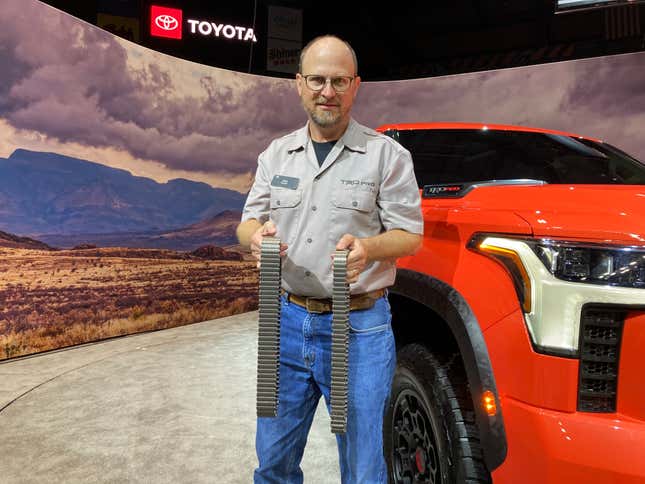
The same BorgWarner transfer case that’s in the Tundra will also go into trucks from competitors, but Toyota uses a drive chain that’s up to half an inch beefier than what its competitors use. That’s 1.75 inches for the Tundra, and 1.25-1.5 inches for its rivals.
There is no official pricing for the ’22 Tundra yet. We also won’t know what the fuel efficiency numbers will look like until Toyota and the EPA suss that out. I hope the price doesn’t increase too much, while the number of miles per gallon for the hybrid increase by a lot.
